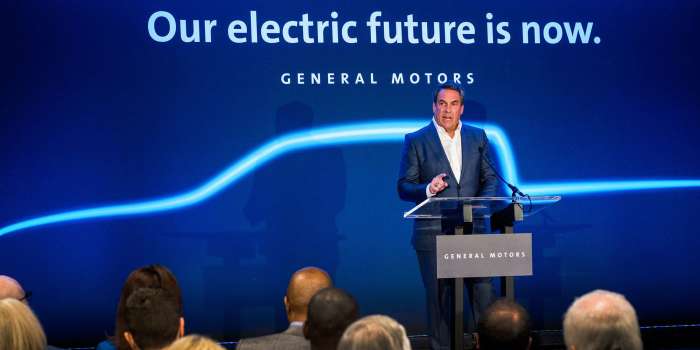As Congress and the Chief Executive finalize a new borrow and spend corporate welfare bill, the EV tax incentive is a hot topic. Many EV fans, owners, and advocates are certain that a new EV tax incentive is a good thing. Why it is good is less clear. One thing that is not in question is that buyers still have no clue how the current one works.
Related Story (2017): Republicans Include Electric Vehicle Tax Benefit In New Tax Law
Electric Vehicle Tax Incentive - How Does It Work
Do you get the incentive as a rebate when the vehicle is bought? Will your taxes be lowered if you lease? If you don’t earn enough in pay to incur a $7,500 tax bill, do you get a check for the difference? No X3 is the answer. Still, many folks still fill social media clubs asking these questions, despite the fact that EV tax incentives started not one, but four Presidents ago.
What Confuses Buyers Also Confuses Dealers
A recent post in an EV vehicle club on social media summarized so succinctly how confusing the EV tax incentive is we simply had to steal it. The only funny part of these posts is the conflicting answers in the comments under them. The buyer that posted it is no different than any other buyer, and the particular vehicle makes little difference, so we have “sanitized” the post to protect anyone from unfair embarrassment. Here is the edited post illustrating the confusion many buyers struggle with:
“Hi folks, I’m new to the group and am in the process of looking at the EV Car as my first EV. I had a question about the Federal tax credits and have been getting different answers on how it works from different sources. When I go on the EV Car Manufacturer site and configure the car on the buying page it says that it is $48k vehicle, but could be as low as $40 after the federal tax credit. Since I was getting so many varying answers, I called up EV Car Manufacturer to ask them and they told me that they discount the full tax credit when you buy the car. However, accountants I ask say the tax credit isn’t a rebate, but something you can claim on your taxes. So, who is correct?”
Feel free to answer in the comments below. All we will say is that the anonymous EV Car Manufacturer is one that still qualifies for the incentive.

What Were the Goals of the EV Tax Incentive and Did They Work
The funny thing about EV tax incentives is that they seem to have done the trick. Here are some of the goals of the federal EV tax incentive, which was intended to be temporary, and some facts.
1) Make EVs more affordable - New Bolts were costing under $20K this spring with no tax incentive. Tesla Model 3 SR+ owners swear to you it is an “affordable car.”
2) Make EVs easier for automakers to sell - Tesla cars are now close to a year out for new orders. Elon Musk said via Twitter last week that Tesla is only production constrained, meaning Tesla sells all the cars it can build as fast as they are built. EVs of almost every brand are selling at prices way over MSRP. Almost no brands’ EVs are sitting unsold anywhere in America. How much “easier to sell” could EVs possibly be?
3) Encourage manufacturers to transition to EVs - GM told anyone who would listen three years ago that “GM’s all-electric future was now.” Tesla has always been all-electric and has a trillion-dollar market capitalization. Ford, Jeep, Toyota, Subaru, Hyundai, Kia, Nissan, Mazda, and Mitsubishi all have new electric vehicles coming out this very year. Some brands have many. Other all-electric brands like Rivian are being buried in orders. Some German brands have told the world they are no longer developing any gas motors, just electric. How much more could manufacturers do to prove they are making EVs a priority?
EV Tax Incentives Won't Help Consumers - Here's Why
Tesla and other brands have been hard at work rapidly raising prices for the EVs they are offering. These increases in price, of more than $5K in some cases, are in advance of the expected EV discounts. How will EV tax incentives help buyers in a world where five-figure markups are commonplace and some are as high as $20K. Won’t manufacturers and dealers simply raise prices by the amount of the tax incentive?
Feel free to offer your comments in the section below. Your opinion matters here at Torque News.
Top of page image by John Goreham. Re-use with permission only.
John Goreham is a long-time New England Motor Press Association member and recovering engineer. John's interest in EVs goes back to 1990 when he designed the thermal control system for an EV battery as part of an academic team. After earning his mechanical engineering degree, John completed a marketing program at Northeastern University and worked with automotive component manufacturers, in the semiconductor industry, and in biotech. In addition to Torque News, John's work has appeared in print in dozens of American news outlets and he provides reviews to many vehicle shopping sites. You can follow John on TikTok @ToknCars, on Twitter, and view his credentials at Linkedin
Re-Publication. If you wish to re-use this content, please contact Torque News for terms and conditions.
Set Torque News as Preferred Source on Google












Comments
congratulations you just
Permalink
congratulations you just added to the confusion. first you state buyers are confused, then you post a sample of said confusion.
But you then refuse/fail to clarify exactly what the program is/will be.
Rube Goldberg anyone ?
But of course, your excuse is that no legislation has yet been signed into law.
As of this story's
Permalink
In reply to congratulations you just by tangible (not verified)
As of this story's publication, there is an EV tax incentive law. It was signed by President Trump in 2017 and is still in effect. The story offers three common questions and provides three answers.